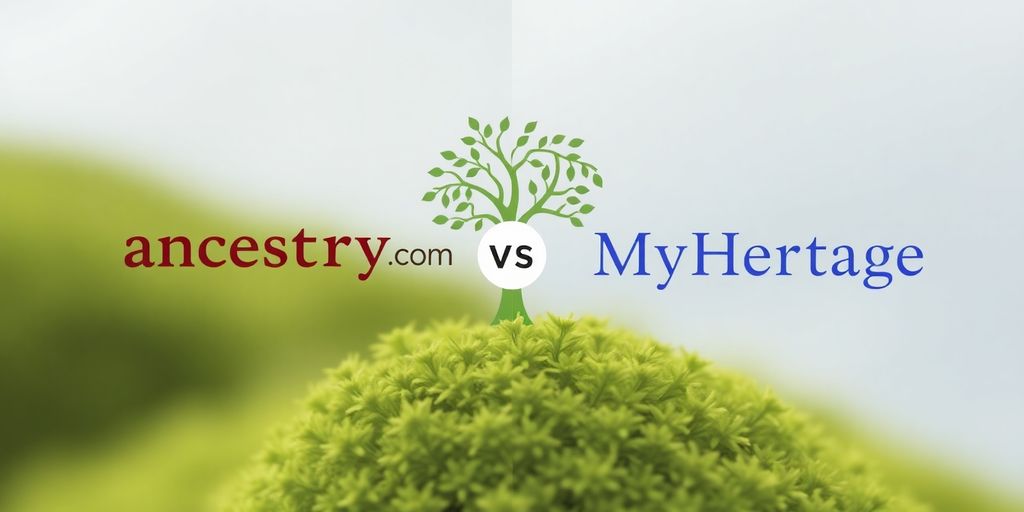Ancestry.com vs MyHeritage: A Comprehensive Comparison for 2024

Choosing between Ancestry.com and MyHeritage for DNA testing in 2024? It’s a bit like picking between two great movies. Both offer fascinating insights into your ancestry, but they have different features and strengths. Whether you’re curious about your family tree, ethnicity, or connecting with relatives, both services have something to offer. Let’s break down the key points to help you decide which might be the better fit for you.
Key Takeaways
- Ancestry.com offers a larger database, which could mean more matches and detailed insights, especially for U.S. users.
- MyHeritage tends to be quicker with results and is often more budget-friendly, making it a good choice for those in Europe.
- Both services provide user-friendly tools for building family trees and accessing historical records.
- Privacy policies are crucial; both companies have measures in place, but it’s good to review them yourself.
- Customer reviews are mixed, with some users preferring the depth of Ancestry.com’s reports, while others like the speed of MyHeritage.
Understanding The Core Features of Ancestry.com and MyHeritage
Types of DNA Tests Offered
When it comes to DNA testing, both AncestryDNA and MyHeritage DNA offer comprehensive services that delve into your genetic makeup. AncestryDNA primarily focuses on ethnicity estimation and connecting users with potential relatives. It provides insights into your ethnic background, which can be particularly useful if you’re looking to explore your roots. MyHeritage DNA, on the other hand, not only offers ethnicity estimates but also includes health insights if you opt for their DNA Health Upgrade. This can help you understand any potential genetic risks you might face.
Sample Collection Process
Collecting a DNA sample is straightforward with both services. AncestryDNA requires you to spit into a tube, while MyHeritage uses a cheek swab. These methods are easy to do at home and don’t require any special skills. Once you’ve collected your sample, you simply mail it back to the company in the prepaid envelope provided. Both companies ensure that the process is as hassle-free as possible, making it accessible for everyone.
Turnaround Time for Results
Waiting for your DNA results can be an exercise in patience, but both companies strive to deliver results promptly. Typically, AncestryDNA results are available within 6-8 weeks from the time they receive your sample. MyHeritage tends to be a bit quicker, often providing results in about 3-4 weeks. However, these times can vary based on demand and other factors. It’s important to check the current expected timeframes when you submit your sample.
Comparing Database Size and Coverage
Total DNA Samples Available
When it comes to the sheer number of DNA samples, Ancestry.com holds the crown. With a vast collection of over 25 million DNA records, it significantly outpaces MyHeritage, which has around 8 million. This larger database means Ancestry can often provide more precise matches and insights, simply because there’s more data to compare against.
Historical Records Comparison
Both Ancestry and MyHeritage offer extensive historical records, but there’s a clear leader here as well. Ancestry boasts access to 60 billion historical documents. These include birth, marriage, and death certificates, as well as census data and military records. MyHeritage, while still impressive, offers around 20 billion records. This difference can be crucial if you’re deep into building a detailed family tree.
Geographical Strengths of Each Service
The geographical coverage of these services can vary, affecting how well they might serve your specific needs. Ancestry is dominant in the U.S., offering detailed insights particularly useful for those with American roots. Meanwhile, MyHeritage shines in European regions, providing more accurate ethnicity estimates and matches for users with European ancestry. This is something to consider if you’re trying to trace your lineage in specific parts of the world.
While Ancestry.com has the advantage in database size and American coverage, MyHeritage’s strength in Europe makes it a compelling choice for those with European ancestry. Each service has its own unique strengths, making them both valuable tools in the quest to uncover your family’s past.
For those considering alternatives, you might want to discover the top 5 alternatives to Ancestry.com for genealogical DNA testing, which could offer different features that better suit your needs.
Evaluating Ethnicity Estimates and Reports
Accuracy of Ethnicity Estimates
When it comes to understanding your ethnic roots, both AncestryDNA and MyHeritage offer ethnicity estimates, but there are some differences in detail and precision. AncestryDNA has recently upgraded their ethnicity estimates, now called "Ancestral Regions," which aim to provide a more accurate depiction of your ancestral origins by comparing your DNA to a broader range of geographical areas. This allows for a more detailed understanding of your genetic heritage. With over 2,600 ethnic regions, AncestryDNA potentially offers more precise estimates compared to MyHeritage’s 2,000+ regions.
MyHeritage, while slightly behind in the number of regions, still provides a comprehensive breakdown of your ethnic background. However, users have noted that AncestryDNA tends to be more accurate, especially for regions that are less common in DNA databases.
Presentation of Ethnicity Results
Both AncestryDNA and MyHeritage present their ethnicity results in an easy-to-understand manner, using maps and charts to visually represent where your ancestors might have lived. MyHeritage uses a vibrant, color-coded map to show your ethnic breakdown, which is visually appealing and straightforward. AncestryDNA offers a similar map but includes more historical context and detailed descriptions for each region, which can be particularly useful for those interested in the stories behind the numbers.
User Experience with Reports
The user experience for viewing ethnicity reports can vary between the two platforms. AncestryDNA’s interface is often praised for its intuitive design and detailed explanations, making it easier for users to explore their ancestry in depth. MyHeritage, on the other hand, offers a more streamlined approach with quick access to your ethnic breakdown and related historical insights.
Users typically find AncestryDNA’s reports to be more engaging due to the additional context provided. However, both platforms allow users to click on specific ethnicities or regions to learn more, which can be a fun way to dive deeper into your family history.
Understanding your ethnic roots can be an enlightening journey. Whether you choose AncestryDNA or MyHeritage, both platforms offer valuable insights into your past, helping you connect with your heritage in meaningful ways.
Analyzing Pricing and Subscription Options
Cost of DNA Kits
When it comes to DNA kits, the pricing can be a deciding factor for many. MyHeritage DNA is generally the more affordable option. Typically, a MyHeritage DNA kit costs about 40% less than an AncestryDNA test kit. While both companies often run sales, MyHeritage’s lower base price makes it attractive for budget-conscious consumers. AncestryDNA kits usually start at $99, whereas MyHeritage kits are priced around $89, though actual prices may vary due to promotions.
Subscription Tiers and Benefits
Both Ancestry.com and MyHeritage offer various subscription plans that provide access to their extensive databases and additional features. Here’s a quick look:
| Service | Annual Subscription Cost | Notable Features |
|---|---|---|
| Ancestry.com | Starts at $299/year | US Discovery, World Explorer options |
| MyHeritage | Starts at $129/year | Premium, PremiumPlus, Complete plans |
- Ancestry.com offers several tiers:
- MyHeritage has a simpler structure:
Promotions and Discounts Available
Both companies frequently offer discounts, especially around major holidays. Ancestry.com provides discounts for longer-term commitments, like 6-month billing cycles. MyHeritage, on the other hand, often has special pricing for the first year of a new subscription. It’s worth keeping an eye out for these deals if you’re considering a subscription.
When weighing the costs, consider what each service includes in their subscription. While MyHeritage might be cheaper, Ancestry.com could offer more value depending on what you’re looking for. Evaluate your needs and see which service aligns better with your budget and research goals.
Assessing Privacy and Security Measures

Data Protection Policies
When it comes to protecting your personal information, both Ancestry.com and MyHeritage take it seriously. They have comprehensive privacy policies that outline how your data is collected, stored, and used. Ancestry.com encrypts your data both in transit and at rest, ensuring that it’s safe from unauthorized access. MyHeritage, on the other hand, emphasizes their commitment to privacy by being one of the few companies that are GDPR compliant, providing an extra layer of security for European users.
User Control Over Data
Both platforms give users control over their data, but they do it in slightly different ways. Ancestry.com allows you to download your raw DNA data and delete it from their servers if you choose. MyHeritage also provides options for downloading your data and deleting it, but they go a step further by allowing users to manage their consent settings, giving you more control over how your data is used in research or shared with third parties.
Transparency in Data Usage
Transparency is key when it comes to data usage, and both companies strive to be clear about their practices. Ancestry.com provides a detailed breakdown of how your data might be used, including in internal research and for improving their services. MyHeritage is transparent about their data usage policies too, and they offer a clear explanation of how they use your data to enhance user experience and contribute to scientific research. Understanding these practices is crucial for users who are concerned about their privacy.
In today’s digital age, knowing how your personal information is handled is more important than ever. Both Ancestry.com and MyHeritage are committed to maintaining high standards of privacy and security, ensuring that your data is protected and used responsibly.
For more insights into MyHeritage’s privacy measures, check out this review.
Exploring Community and Additional Features
Family Tree Building Tools
Building a family tree is like piecing together a giant puzzle, and both Ancestry.com and MyHeritage offer tools to help you do just that. Ancestry’s Family Tree Builder provides a user-friendly interface that allows you to add photos, stories, and documents to each family member. MyHeritage, on the other hand, offers a similar feature but with a twist. They include a Chromosome Browser that lets you dive deeper into your genetic connections, which could be a game-changer for those who love digging into the details.
Access to Historical Records
When it comes to historical records, both platforms have their strengths. Ancestry boasts a massive collection of records, including census data, military records, and immigration details. MyHeritage, while smaller, offers unique collections that might not be available elsewhere. Their global reach is impressive, providing access to records from countries that are often underrepresented in genealogy databases.
User Forums and Support
Exploring your ancestry can be a solo journey, but it doesn’t have to be. Both Ancestry and MyHeritage have vibrant user communities where you can share discoveries and get advice. Ancestry’s user forums are extensive, covering a wide range of topics from DNA results to family tree tips. MyHeritage also offers support through forums, but they shine with their customer service, offering assistance in multiple languages and quick response times. Whether you’re a newbie or a seasoned genealogist, having a community to lean on can make all the difference.
Discovering your roots is not just about the past; it’s about connecting with others. These tools and communities offer a way to make those connections meaningful.
Reviewing Customer Feedback and Ratings

Trustpilot Ratings Comparison
When it comes to user reviews, both Ancestry.com and MyHeritage have their fair share of fans and critics. On Trustpilot, MyHeritage boasts a 4-star rating from over 52,812 users, reflecting a generally positive reception. Ancestry.com, on the other hand, holds a slightly lower rating of 3.6 stars, based on feedback from 28,086 users. It’s clear that while both platforms are popular, MyHeritage seems to edge out in user satisfaction on this platform.
Common User Complaints
Even with decent ratings, both services face recurring complaints. For MyHeritage, users often mention issues with subscription renewals and unexpected charges. Ancestry.com users frequently express dissatisfaction with customer service and the complexity of canceling subscriptions. These concerns highlight areas where both companies could improve to enhance user experience.
Overall Satisfaction Levels
Overall, customer satisfaction varies, with many users praising the detailed reports and extensive databases both platforms offer. However, the ratings suggest a slight preference for MyHeritage among users. Many appreciate the ease of use and the breadth of information available. Still, potential customers should weigh these reviews carefully to decide which service aligns best with their needs.
Customer feedback paints a picture of what real-world users experience with these services. It’s a mixed bag, but understanding these perspectives can guide new users in making informed decisions.
Conclusion
So, there you have it. Picking between Ancestry.com and MyHeritage isn’t exactly a walk in the park. Each has its own perks and quirks. If you’re all about diving deep into a massive pool of historical records, Ancestry might be your go-to. It’s got the biggest database out there, which is a big deal if you’re trying to connect with long-lost relatives. But if you’re looking for something that’s easy on the wallet and quick with results, MyHeritage could be your best bet. It’s known for its speed and affordability. At the end of the day, it really boils down to what you’re after in your genealogical journey. Whether it’s the depth of data or the speed of service, both platforms offer something unique. So, take your pick and start uncovering those family secrets!
Frequently Asked Questions
What kinds of DNA tests do Ancestry.com and MyHeritage offer?
Both Ancestry.com and MyHeritage provide ancestry DNA tests that help you learn about your ethnic roots and find relatives. However, MyHeritage also offers a health upgrade that provides insights into potential health risks.
How do I collect a DNA sample for testing?
Collecting a DNA sample is simple. Both companies use a cheek swab method. You just swab the inside of your cheek and send it back to their labs in a prepaid envelope.
How long does it take to get my DNA test results?
For Ancestry.com, it usually takes around 6-8 weeks to get your results. MyHeritage is a bit faster, typically delivering results in about 3-4 weeks.
Which service has a larger database for finding relatives?
Ancestry.com has the largest database, making it easier to connect with distant relatives. MyHeritage also has a large database but focuses more on European connections.
Are my DNA results private and secure?
Yes, both companies have strict privacy measures in place. They protect your data and allow you to control how your information is used and shared.
What is the cost of a DNA test from these companies?
The cost varies. Ancestry.com DNA tests start at around $99, while MyHeritage tests are generally cheaper, starting at about $89. Prices can change with promotions and discounts.








Responses